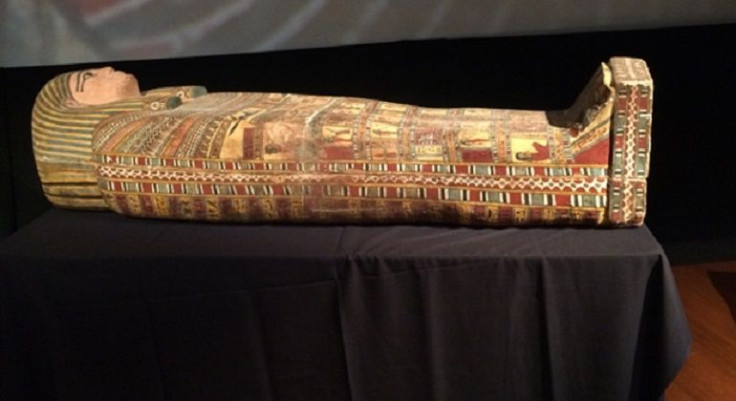US Returns $2.5M In Egyptian Antiquities As Experts Call For Tougher Punishment On Smugglers

Federal agents found the stolen sarcophagus in a garage in Brooklyn, New York.
The tale of how a centuries-old coffin from Egypt found its way to New York City is one of globetrotting art dealers, looters, and illicit traders. They're just a small part of a vast international network whose activities help fund criminal groups and even terrorist organizations.
This week, the ancient casket begins its journey home.
The coffin had been emblazoned with the name Shesepamutayesher and the title “Lady of the House” sometime between 664 and 111 B.C. But when Special Agent Brenton Easter of the U.S. Department of Homeland Security (DHS) uncovered the artifact Sept. 8, 2009, after months of investigation, it had been slapped with a few false shipping labels.
The sarcophagus is just part of a $2.5 million collection of items recovered as part of Operation Mummy’s Curse. The investigation represents a new kind of U.S.-led campaign aimed not only at stopping smugglers and returning stolen relics to their homes, but also at taking down the global antiquities-trading networks that inadvertently help fund terrorist organizations, including the Islamic State group.
“The target now, the goal, is to dismantle the entire transnational criminal organization. So we’re trying to take out the whole network,” Easter tells International Business Times.
The worldwide network for stolen antiquities is old and vast. Though this case involved Egyptian artifacts, in the last few years there’s been a dramatic increase in items coming from Iraq and Syria. Locals in war-torn or unstable areas loot and steal items from ancient sites and sell them to middlemen. The intermediaries transport the items across borders and sell them to antiquities dealers whose clients are wealthy buyers and collectors. Profits flow to the criminal organizations and terrorist groups such as the Islamic State group -- also known as ISIS or ISIL -- which manage a growing market that experts say is becoming more lucrative.
“It’s opportunity. During a time of war people take advantage of the lack of security,” says Leila Amineddoleh, a partner at the law firm Galluzzo and Amineddoleh in New York City, who focuses on art and cultural heritage law. “The problem is that there’s a market for these objects. If there wasn’t a market there wouldn’t be sale or demand.”
Experts disagree about the value of the illicit antiquities trade worldwide, but in 2013, as Syria struggled through a devastating civil war, importers in the U.S. declared $11 million in antiquities from the war-torn country, an increase of 134 percent from the previous year, the U.S. International Trade Commission says. The jump is a red flag for those watching illicit trade.
"The fact that there’s been an increase during a time of conflict strongly suggests it's illegal, because it’s an easy time to mix it in with the good stuff and try to pass it off all at once,” Amineddoleh says. “Anyone in the art market is aware of the problem with looted objects coming out of Syria.”
Head Games
In Easter’s case, it all started with a missing head. An academic source notified Easter at DHS as well as authorities at U.S. Immigration and Customs Enforcement (ICE). The source noticed that the head of an Iraqi statue known to have been looted years ago had suddenly come up for sale on the website of Windsor Antiquities in New York. Mousa “Morris” Khouli, a Syrian-born American antiquities dealer, was the site’s owner.
Easter dug into Khouli’s import records and found that the head wasn’t the only suspicious artifact in Khouli’s collection. Dozens of items, including some labeled as wood panels, listed the country of origin as the United Arab Emirates. For Easter, this was a tip-off. He says it’s highly unlikely that the wood panels came from the UAE, where the dry climate doesn’t produce an abundance of trees.
Soon after, Easter visited Khouli’s gallery on Manhattan’s Upper East Side. Khouli informed him that the items were, in fact, Egyptian, and merely imported from the UAE. The admission was enough for Easter to obtain a warrant. The National Stolen Property Act prohibits the importing of cultural property that violates a foreign country’s patrimony law, and Egypt has an especially strict one. In addition, any importer who uses false information about an object’s country of origin “without reasonable cause to believe the truth of such statement” violates federal law.
Easter recovered the head and other objects from Khouli’s gallery, intercepted shipments in Newark, New Jersey, and eventually found the “Lady of the House” sarcophagus at Khouli’s home, in a crate all ready for shipment.
“It was the first time I ever found something in someone’s garage, that’s for sure,” Easter says.
The total find included wooden panels, two wooden horses, multiple pieces of wood furniture, a second sarcophagus, and a set of Egyptian boats and limestone figures -- among other items -- all of which had been imported illegally. The haul was enough to arrest Khouli on multiple charges, including smuggling and money laundering.

But he wasn’t acting alone. According to an indictment filed in federal court in the Eastern District of New York, three others were named along with Khouli: Salem Alshdaifat, who operated Holyland Numismatics in Michigan; Ayman Ramadan, an antiquities dealer who operated a company called Nafertiti Eastern Sculptures Trading based in Dubai, UAE; and Joseph A. Lewis II, a New York collector of Egyptian antiquities and CEO of Pharma Management Corp., based in Chesterfield, Pennsylvania.
Poster Boy?
At the time, the U.S. Department of Justice called the case “groundbreaking.” U.S. Attorney Loretta Lynch noted that “antiquities dealers and collectors are on notice that the smuggling of cultural patrimony will not be tolerated,” and ICE agent Chris Hayes added that it’s especially important that the case focuses on money laundering. “This is notable because the illicit sale of cultural property is the third most profitable black market industry following narcotics and weapons trafficking,” Hayes said.
But the case wasn’t that simple. According to a news release, each defendant faced the possibility of 20 years behind bars, but in the end no one served time.
Alshdaifat, who court documents say was a part of sales transactions between Khouli and sellers abroad, eventually pled to the charge of “accessory after the fact to making a false official writing.” He paid a $1,000 fine, a 2013 judgment said. Charges against Lewis, the collector who paid more than $150,000 for various pieces, were dismissed in February 2014 after two-and-a-half years and more than $1 million in legal fees. He told the Richmond Post-Dispatch it was “the fight of my life.”
Khouli received the toughest punishment, but still avoided prison.
In court, the prosecution argued that this wasn’t the first time Khouli was involved in such trade, noting an incident in 2003 in which he was found with a shipment of Iraqi glass bottles he had labeled as coming from Britain.
“He was not charged but he was warned,” prosecutor Karin Orenstein argued, court transcripts said. “And yet for the next five years he did it again.”
However, the judge sided with the defense, which argued that the case of Khouli -- a father of four children and the sole breadwinner for his family -- was not one with which to send a message. (Court documents show that Khouli asked the judge to “please allow me to support my kids.”)
“I respectfully suggest that Morris Khouli is not the poster child for a custodial term,” his defense attorney Gerald Shargel argued, noting that there were many other cases in which people committed more egregious conduct, such as actually looting graveyards, who never saw prison time. Khouli’s situation “pales in comparison to those cases,” he argued.
In the end, he served one year of probation with six months of home detention and 200 hours of community service.
The Crackdown
The sentence is typical. Almost no one goes to prison in the U.S. for illicit antiquities trading. There hasn’t been a criminal prosecution resulting in prison time since 2001. But that could soon change -- thanks to the Islamic State group.
Of course, cultural property trafficking is almost as old as the objects themselves, but things have changed in recent decades, said an April report from the Thirteenth United Nations Congress on Crime Prevention and Criminal Justice.
“Globalization has facilitated the increasing involvement of organized criminal groups, leading to globalized illicit markets in stolen cultural property and the possibility of generating significant profit for organized criminal groups and, possibly, terrorist groups,” it reads.
Of course, although this has happened before, most notably in Cambodia between 1970 and 1990, the unique reach of the Islamic State group has drawn a great deal of attention.
After the group’s high-profile looting and destruction of dozens of ancient heritage sites, it’s not just anthropologists who are worried. Though trading in illicit antiquities doesn't provide nearly as much income as the group gets from other revenue streams such as oil sales, and nobody can really say exactly how much it’s worth, the fact that ISIS is involved has accelerated the issue to the policy forefront.
Any archaeologist or antiques dealer knows that illegal artifacts from Syria won’t appear on the market anytime soon. In general, when traders know they have illicit items on their hands, they sit on them for some time.
In the meantime, the only defense against this billion-dollar trade is deterrence.
“When a dealer or a smuggler or a looter brings something into the United States and gets picked up at the border, that’s just the cost of doing business for them,” says Patty Gerstenblith, a law professor at DePaul University and founding president of the Lawyers Committee for Cultural Heritage Preservation, to an audience of archaeologists, lawyers and academics at a recent LCCHP conference in Philadelphia.
“It’s not discouraging anyone from engaging in this activity. And it’s not keeping the things in the ground.”
But in the past few months, politicians and policymakers are joining the archaeologists and historians who have long advocated for a crackdown on cultural crime. Since they can’t do much about the activity on the ground, their only choice is to target the buy-side.
In February, the U.N. Security Council approved Resolution 2199, targeting the finance sources of the Islamic State group. The resolution explicitly banned trade in antiquities from Syria and reaffirmed a similar ban on items from Iraq made about a decade ago.
The United States has also taken action. For instance, the U.S. Treasury recently named black market antiquities as a major source of funding for the Islamic State group and is working on curbing trade. On March 30, U.S. Rep. Eliot Engel, D-N.Y., and co-sponsors introduced the Protect and Preserve International Cultural Property Act that would, among other things, direct the president to impose import restrictions on material coming from Syria.
“To date, our efforts to eliminate ISIL’s sources of funding have focused primarily on preventing oil smuggling and denying ransoms demanded for kidnapping. However, a comprehensive effort must also cover looting and trafficking of cultural property, which has become a significant source of funding for ISIL and other terrorist organizations,” Engel and three others wrote in a letter to Adam J. Szubin, acting undersecretary for terrorism and financial intelligence. “We urge you to protect Syrian cultural property by establishing these sanctions under existing authorities as soon as possible.”
In a Wednesday ceremony in Washington, D.C., federal authorities handed the "Mummy's Curse" antiquities over to Egyptian officials, who will ensure they get safely home.
© Copyright IBTimes 2024. All rights reserved.












